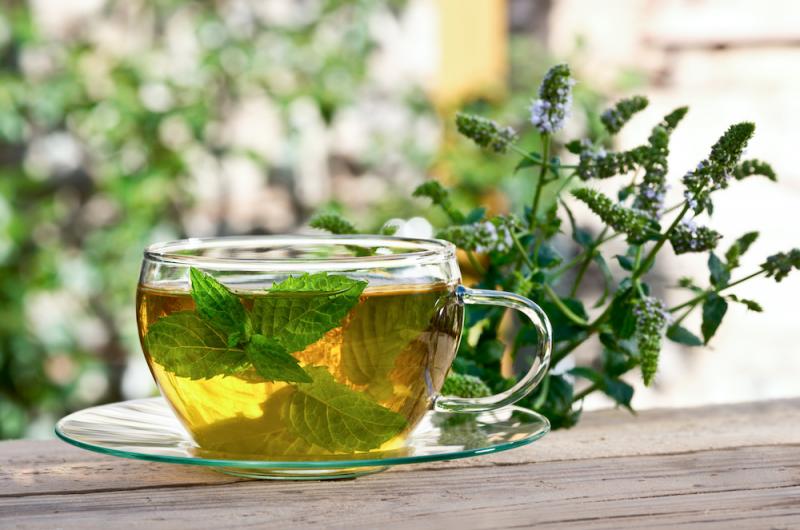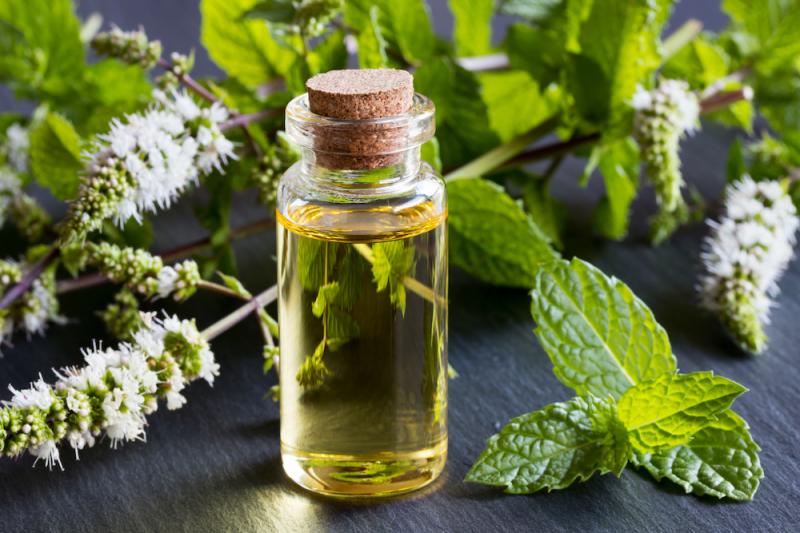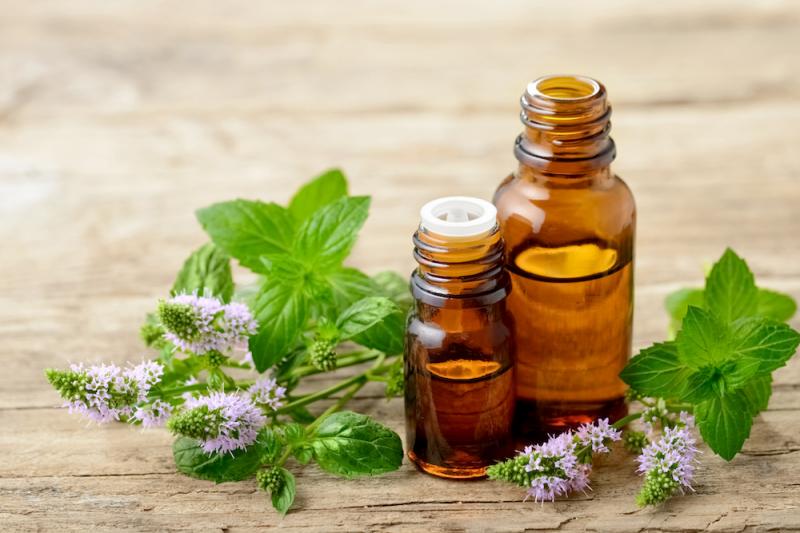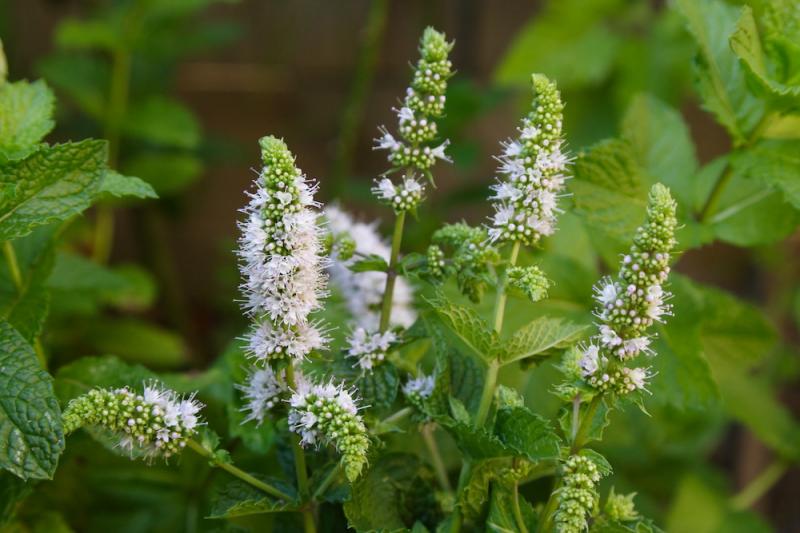
The mint family (Lamiaceae) is loaded with useful medicinal herbs, most of which are aromatic, including thyme, sage, marjoram, basil, hyssop, horehound, rosemary, lavender, lemon balm, bergamot, pennyroyal, and catnip. All of these plants have a characteristic square stem with opposite leaves that alternate up the stem. Once you recognize this growth pattern, as well as their irregular blooms, it’s pretty easy to recognize a Lamiaceae plant.
But the subject of this article are the members of the Mentha genus, the mints for which the family is named. The two most well-known are peppermint (Mentha × piperita) and spearmint (Mentha spicata). But there are numerous varieties of mints, including a variety of peppermint called chocolate mint.
Mentha plants readily interbreed and the ‘x’ in the Latin name signifies the plant is a hybrid. Some varieties I’m familiar with include pineapple mint (Mentha suaveolens), apple mint (Mentha × rotundifolia), and orange mint (Mentha × piperita 'Citrata'), all of which I’ve tried growing. And as I've found from experience, most if these plants are invasive perennials—once you get them started in your garden they’ll spread like weeds, so it’s a good idea to find a way to contain them if you plan on growing them.
For purposes of this article, we’ll focus on peppermint, although just about everything we discuss will also apply to spearmint, with spearmint having a slightly milder action. And, much of it applies to other mints as well.
Peppermint Herb
 Peppermint’s primary claim to fame is its ability to settle the stomach, relieving gas, bloating, and indigestion. It’s best taken as a tea for this purpose. Medicinally the tea is prepared as an infusion and it’s more effective when made with the fresh herb instead of the dried powder.
Peppermint’s primary claim to fame is its ability to settle the stomach, relieving gas, bloating, and indigestion. It’s best taken as a tea for this purpose. Medicinally the tea is prepared as an infusion and it’s more effective when made with the fresh herb instead of the dried powder.
The herb is mildly antispasmodic, so it can ease stomach and intestinal cramping and hiccups. It will relieve headaches associated with indigestion as well. It even has some antinausea effects, so it can also ease nausea and motion sickness. The tea is a very good remedy for settling the stomach after vomiting.
Peppermint is also a helpful remedy for colds and flu, especially when there is a mild fever. For this purpose, you can combine it with other sudorific (sweat-enhancing) herbs such as elderflower, yarrow, boneset, chamomile, and lemon balm. Drink the warm tea and soak in a hot bath to help open up the sweat glands, bring down the fever, and speed recovery.
Peppermint can also help cool you down in the heat of summer. Try making some lemonade and adding a spring of fresh peppermint to it after you’ve been outdoors in the sun to help cool down your body and revive your energy.
Peppermint Essential Oil
 Peppermint oil is a minty, herbaceous oil, with a hint of sweetness. Even though it has stimulating effects, it feels cooling and refreshing. It is also one of the more popular essential oils and one of the first essential oils I used extensively for myself and my family.
Peppermint oil is a minty, herbaceous oil, with a hint of sweetness. Even though it has stimulating effects, it feels cooling and refreshing. It is also one of the more popular essential oils and one of the first essential oils I used extensively for myself and my family.
If you want to get the stomach-settling effects of the tea while using the essential oil simply add a drop or two to a half of a cup of warm water, stir it up, and sip it slowly. You can also place a drop of the oil directly on your tongue.
Peppermint oil can also be applied topically, undiluted, to insect bites and stings. It can also be diluted in a fixed oil and used as a massage oil for itchy skin. I’ve also applied a drop of peppermint oil to a canker sore to ease the pain.
Inhaling peppermint oil or placing a drop on the back of your tongue will stimulate your brain and help you stay alert while studying, driving, or doing other activities that require mental alertness and focus. Both peppermint tea and the essential oil can also reduce brain fog and ease physical and emotional shock. Peppermint is also a mild mood-elevator that can be helpful for mild depression.
Menthol
Menthol is a major component of peppermint oil, as well as other mentha species. It’s obtained by freezing the essential oil, which makes it possible to extract the menthol crystals. Menthol binds to receptors for cold in the skin and mouth, which is why it feels cooling, even though it is not actually cold.
Menthol is analgesic and is often used in topical preparations to ease pain. It interacts with opioids and GABA, reducing muscle contraction and pain. It even slightly lowers blood pressure. It’s also mildly antimicrobial and is a common ingredient in cough drops and sore throat lozenges.
Peppermint oil, though not as strong as straight menthol, will also have some of these effects. It can be applied topically to ease pain and fight infection. It can also be taken internally for infection.
Enteric Coated Peppermint Oil
 Because peppermint is carminative, antispasmodic, and antimicrobial it’s a very good remedy for irritable bowel syndrome (IBS), inflammatory bowel disease (IBD), and small intestinal bacterial overgrowth (SIBO). The tea will be moderately helpful as well the essential oil, but the best way to take it to ease these problems is as enteric-coated peppermint oil. The enteric coating on the oil keeps it from breaking down until it reaches the small intestines.
Because peppermint is carminative, antispasmodic, and antimicrobial it’s a very good remedy for irritable bowel syndrome (IBS), inflammatory bowel disease (IBD), and small intestinal bacterial overgrowth (SIBO). The tea will be moderately helpful as well the essential oil, but the best way to take it to ease these problems is as enteric-coated peppermint oil. The enteric coating on the oil keeps it from breaking down until it reaches the small intestines.
You can get a similar effect by combining peppermint oil with olive or coconut oil. The oil binds to the fat, which does not break down in the stomach. When the oil hits the small intestines and breaks down it releases the essential oil there. You can mix 4-5 drops of olive oil and 4-5 drops of peppermint oil and put it in a gel cap to swallow. You can also add the oil to some melted, room-temperature coconut oil and put it in the fridge, taking a small spoonful as needed.
Peppermint Flower Essence
 The way that peppermint clears congestion in both the digestive system and the mind relates directly to its uses as an emotional remedy. As a flower essence, peppermint is for the person who can’t balance the instinctual forces of the body (such as appetite and digestion) with the higher mental functions. They may be overly pensive, engaged in excessive mental activity, and unable to relax when eating.
The way that peppermint clears congestion in both the digestive system and the mind relates directly to its uses as an emotional remedy. As a flower essence, peppermint is for the person who can’t balance the instinctual forces of the body (such as appetite and digestion) with the higher mental functions. They may be overly pensive, engaged in excessive mental activity, and unable to relax when eating.
When they do eat, they may feel mentally dull and sluggish. They may have difficulty focusing or digesting new information. Peppermint cools digestive upset while warming mental activity. It settles the stomach and clears the head. So, if you regularly experience brain fog when you eat and tend to suffer from gas, bloating, and indigestion, peppermint essential oil or flower essence may help.
Peppermint is an extremely safe remedy. However, you can overdo it with the essential oil. Don’t give children under six the essential oil orally, use the tea instead. Peppermint is also a great herb to help flavor other less pleasant herbs. Spearmint and other mints can be especially good as flavorings. I use peppermint in a variety of herbal formulas, including the pregnancy tea, children’s composition, and herbal minerals, all of which are described in both Modern Herbal Dispensatory and Strategies for Health.
Steven's Articles
-

-
The Evidence for Berberine
A yellow alkaloid found in traditional infection-fighting…
-

-
The Sensible Use of Caffeinated Herbs
Kola nuts, guarana, and yerba mate and other herbs…
-

-
The Health Benefits and Problems with Coffee
This popular caffeinated beverage can be beneficial…
October
-

-
Understanding Caffeine & Cellular Adaptation
Preserving the power of caffeine's buzz and the…
September
-

-
Horseradish
A pungent spice for aiding protein metabolism…
-

-
Banaba or Crepe Myrtle
A beautiful tree from Southeast Asia whose leaves…
August
-

-
Monkeyflowers
Flower essences to help see ourselves more clearly…
-

-
Mariposa Lilies
Strengthening the bond between mother and child…
-

-
The Noble Bay Leaf
A common kitchen herb for aiding digestion and…
-

-
Epimedium: Horny Goat Weed
A circulatory stimulant and kidney yang tonic…
July
-

-
The Medicinal and Nutritional Benefits of Apricots
A nutritious fruit and valuable medicinal seed for coughs
-

-
Dogwoods
Asian dogwood is used to stop excessive discharge,…
June
-

-
Neem: The Village Pharmacy
A popular Ayurvedic remedy for dental and immune…
-

-
Spilanthes: The Toothache Plant
A traditional remedy for teeth and gums, as well…
-

-
Forsythia
An anti-inflammatory, fever-reducing, and infection fighting herb

